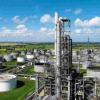hi all
i have 1 question
does hydrogen increasing his volume when it is heating as most of gases?
|
|
Heating Of Hydrogen
Started by Beergson, Oct 25 2007 10:41 AM
5 replies to this topic
Share this topic:
#1

Posted 25 October 2007 - 10:41 AM
#2

Posted 25 October 2007 - 10:49 AM
Beergson:
This is a professional engineering Forum and your question is a very elementary one. Please don't take my comment(s) as a criticism of you, but the question is one known to all engineers. I would ask you if you are an engineer in order to better respond to your query.
Basically, Hydrogen is certainly a gas and, as such, will behave as all other gases in obeying the various gas laws. Therefore, it will certainly expand (increase its volume) when heated. This effect is covered in high school chemistry, I believe.
#3

Posted 25 October 2007 - 11:06 AM
I know that it was very elementary question
but i needed to make me certain
my ucertainty was produced by inverse Joule-Thompsone effect
sorry
but i needed to make me certain
my ucertainty was produced by inverse Joule-Thompsone effect
sorry
#4

Posted 25 October 2007 - 11:30 AM
You originally asked: "does hydrogen increasing his volume when it is heating....?"
Now you add that you are presumably dealing with the Joule-Thomson Effect. Now, we are getting more details and information and can further explain or add comments. The question is now out of the realm of high school chemistry and physics and further into thermodynamics - which makes it a little more difficult to understand.
Under certain conditions of pressure and temperature, Hydrogen and Helium (unlike the majority of all other normal gases) will heat up when expanded to a lower pressure through a throttling device such as a valve or a porous plug. What one would normally expect is that the gas(es) would cool down upon expansion. This process is well documented in the Joule-Thomson studies of real gases (as opposed to "ideal" gases).
If you expand Hydrogen from a high to a lower pressure, it will occupy more volume at the lower pressure - and if the initial conditions are right, it will also be heated at the lower pressure. I hope this is what you were trying to obtain from us as a response. If not, please clarify my wrong assumptions or correct me.
I hope I have helped your understanding.
#5

Posted 25 October 2007 - 11:45 AM
A point of clarification (or self questioning).
I understood that expanding H2 or He would almost always result in heating because the inversion temperature of these gases is exceedingly low (below 200oC).
When the gas at high pressure is above inversion temperature then DT/DP will be +ve and hence heating will occur.
I understood that expanding H2 or He would almost always result in heating because the inversion temperature of these gases is exceedingly low (below 200oC).
When the gas at high pressure is above inversion temperature then DT/DP will be +ve and hence heating will occur.
#6

Posted 25 October 2007 - 11:49 AM
Art Montemayor:
I really apreciate Your answer
I know that hydrogen is heating when its expanding... (Joule-Thompsone Inversed Effect)
but I wasn't certain if hydrogen will behave as other gases when it is heating
For my logic point of view it should but I wasn't sure..
thank You very much
sometimes the simplest problems makes more difficulties than hard ones...
and of course sorry fot my english
I really apreciate Your answer
I know that hydrogen is heating when its expanding... (Joule-Thompsone Inversed Effect)
but I wasn't certain if hydrogen will behave as other gases when it is heating
For my logic point of view it should but I wasn't sure..
thank You very much
sometimes the simplest problems makes more difficulties than hard ones...
and of course sorry fot my english
Similar Topics
Steam Flow And Heating Time In Batch ReactorStarted by Guest_seagal6_* , 16 Jul 2025 |
|

|
||
Design Capacity Of Hydrogen Pullet During Hydroprocessing Units UpsetStarted by Guest_Divid Kelin_* , 18 Jun 2025 |
|

|
||
Hot Oil Loop / Heating Medium DesignStarted by Guest_Lyne_* , 30 Mar 2024 |
|

|
||
Secondary Heating Loop For ReactorStarted by Guest_TheChemEng_* , 28 Nov 2024 |
|

|
||
How To Arrange The Heating Coil?Started by Guest_nhuthoahuynh13_* , 17 Oct 2024 |
|

|

 FB
FB







